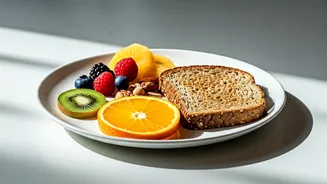Plan Your Meals
Meal planning is a fundamental aspect of successful weight management. Begin by organizing your meals and snacks for the entire week. This allows you to
make healthier choices. Consider using a food journal or a mobile app to track your calorie intake. Planning your meals beforehand prevents impulsive decisions and helps control portion sizes, as it encourages awareness of the foods you consume. Preparing meals at home enables control over ingredients and ensures you are not tempted by high-calorie or unhealthy options. Stick to a schedule and shop for groceries with a list to keep track of your meals. This provides a clear vision for the week, allowing you to anticipate potential challenges and to stay on track with your weight loss goals. Meal planning helps build consistency and creates a sustainable approach to healthy eating habits, aiding long-term success.
Hydrate Regularly
Adequate hydration is essential when trying to lose weight. Drinking enough water each day plays a crucial role in the body's metabolic functions. Make it a goal to drink at least eight glasses of water daily. Water can boost metabolism and helps in the feeling of fullness, which can reduce cravings. It also helps flush out toxins, which is an important factor for overall health. Carrying a water bottle is a good way to monitor your daily intake, allowing you to sip throughout the day. In some cases, substituting sugary drinks with water can significantly cut down on unnecessary calories, which helps in shedding excess weight. Staying hydrated also helps improve your skin's health, offering a visible sign of the positive changes taking place. Make water your go-to beverage and explore herbal teas as an alternative to boost hydration.
Prioritize Protein Intake
Consuming sufficient protein is critical for weight loss. Protein helps you feel fuller, which curbs hunger and reduces overeating. It supports muscle building, which, in turn, boosts metabolism. Include protein in every meal and snack. Some great options include lean meats, poultry, fish, eggs, and plant-based options like beans and lentils. Consider incorporating Greek yogurt, cottage cheese, and nuts into your diet. Protein requires more energy to digest compared to carbohydrates or fats, so the body burns more calories processing protein. By eating protein-rich foods, you also ensure your body is getting the essential amino acids needed to maintain health. Strive for a protein intake range that supports your weight loss goals and meets your individual needs.
Increase Fiber Consumption
Fiber-rich foods play a huge role in weight management by promoting satiety. Fiber slows down digestion and keeps you feeling satisfied for longer periods, reducing the urge to snack between meals. Consume foods rich in fiber, such as fruits, vegetables, whole grains, and legumes. These foods also supply vital nutrients, improving your overall health. Eating fiber can also assist in regulating blood sugar levels, preventing energy crashes and unhealthy food cravings. Fiber promotes healthy digestion, which is important for overall well-being. It can enhance nutrient absorption while reducing the risk of digestive issues. Make sure you’re incorporating fiber into your diet to boost weight loss and gain associated health benefits.
Incorporate Regular Exercise
Regular physical activity is essential for weight loss. Aim for at least 30 minutes of moderate-intensity exercise most days of the week. You can engage in activities like brisk walking, jogging, cycling, or swimming to burn calories and boost your metabolism. Resistance training is another method for improving muscle mass. Increased muscle mass helps burn more calories throughout the day, even while resting. Incorporate a combination of cardio and strength training for best results. Choose activities you enjoy to make exercise a sustainable part of your routine. Consistency is very important, so schedule workouts and treat them like important appointments. Find a workout buddy, sign up for a class, or try new workout options to keep things interesting and stay motivated. Be patient, results take time and dedication, so celebrate your progress.
Reduce Processed Foods
Cutting back on processed foods is critical for accelerating weight loss. Processed foods are generally high in calories, unhealthy fats, added sugars, and sodium, which can impede your weight loss progress. Opt for whole, unprocessed foods as much as possible, like fruits, vegetables, lean proteins, and whole grains. These foods are nutrient-dense and naturally lower in calories. Always read food labels carefully to identify hidden sugars, unhealthy fats, and excessive sodium content. Prepare meals at home more often so you can control the ingredients. Replace processed snacks with healthy options like nuts, fruits, or vegetables. Reduce your intake of processed snacks, fast food, and sugary beverages for optimal results. By making healthier choices, you can improve your overall health and successfully lose weight.
Prioritize Sleep and Rest
Adequate sleep is critical for weight loss and overall health. Poor sleep can cause hormonal imbalances that can make you hungry and increase the chances of overeating. Aim for 7-8 hours of sleep each night to support your weight loss efforts. When you're sleep-deprived, the body produces more of the hunger hormone ghrelin and less of the fullness hormone leptin, potentially leading to overeating. Improve your sleep hygiene by creating a regular sleep schedule, establishing a relaxing bedtime routine, and ensuring that your bedroom is dark, quiet, and cool. Avoid screen time before bed and limit caffeine and alcohol consumption. Prioritizing sleep helps regulate hormones, reduce stress, and improve your body's ability to burn fat effectively. Incorporating these strategies can improve your chances of success.
















